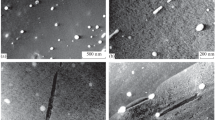Abstract
The temperature dependences of the delayed hydride cracking (DHC) rate of Zr-1Nb and Zr-0.8Nb-0.8Sn-0.3Fe alloy claddings are studied in the range 127–300°C in comparison with the data obtained for Zr-2.5Nb and Zircaloy-4 alloys earlier. The samples are in the state of cold deformation and stress relief at 400°C for 24 h and in the state of preliminary hydrogen saturation to a hydrogen concentration of 0.02 wt %. As the strength of a zirconium alloy decreases and its ductility increases, the DHC rate and its high-temperature limit for a linear Arrhenius equation decreases, and the fractographic patterns of the fracture surfaces are different.
Similar content being viewed by others
References
E. C. W. Perryman, “Pickering pressure tube cracking experience,” Nuclear Energy 17, 95–105 (1978).
P. A. Platonov, A. V. Ryazantseva, G. P. Saenko, et al. “The study of cause of cracking in zirconium alloy channel tubes,” in Proceedings of the ASTM 8th International Symposium (1988), AECL. Report RC-87.
D. Shrire, B. Grappengiesser, L. Hallstadius, et al., “Secondary defect behavior in ABB BWR fuel,” in Proceedings of the International Topical Meeting on Light Reactor Fuel Performance (ANS, West Palm Beach, 1994), pp. 398–409.
P. Efsing and K. Petterson, “Delayed hydride cracking in irradiated Zircaloy cladding,” in Proceedings of the 12th International Symposium “Zirconium in the Nuclear Industry” (ASTM, 2000) pp. 340–355.
H. M. Chung, “Understanding hydrides and hydride-related processes in high-burnup cladding in spent-fuel storage and accident situations,” in Proceedings of the International Meeting on LWR Fuel Performance (Orlando, Florida, 2004), pp. 470–479.
Y. S. Kim, “Delayed hydride cracking of spent fuel rods in dry storage,” J. Nucl. Mater. 378(1), 30–34 (2008).
S. Shimada, E. Etoh, H. Hayasi, and Y. A. Tukuta, “Metallographic and fractographic study of outside-In cracking caused by power ramp test,” J. Nucl. Mater. 327(2), 97–113 (2004).
Y. S. Kim, “Temperature dependence of the delayed hydride cracking velocity in Zr-2.5 Nb tubes,” Mater, Sci. Eng. A 468–470, 281–287 (2007).
V. A. Markelov, P. V. Kotov, and T. N. Zheltkovskaya, “Temperature dependence of delayed hydride cracking of Zr-2.5% Nb alloy,” Materialovedenie, No. 1, 52–59 (2009).
C. Coleman and V. Inozemtsev, “Measurement of rates of delayed hydride cracking (DHC) in Zr-2.5Nb alloys-an IAEA coordinated research project,” in Proceedings of the 15th International Symposium on Zirconium in the Nuclear Industry (ASTM STP, USA, 2007), pp. 244–266.
S. Sagat and M. P. Puls, “Temperature limit for delayed hydride cracking in Zr-2.5 Nb alloys,” in Proceedings of the 17th International Conference on Structural Mechanics in Reactor Technology (SMiRT 17) (Prague, 2003), paper G06-4.
M. Resta Levi and M. P. Puls, “DHC behavior of irradiated Zr-2.5Nb pressure tubes up to 365°C,” in Proceedings of the 18th International Conference on Structural Mechanics in Reactor Technology (SMiRT 18) (Beijing, 2005), paper G10-3.
V. A. Markelov, A. Yu. Gusev, P. V. Kotov, and A. G. Mal’gin, “The temperature dependence and the high-temperature limit of delayed hydride cracking rate of zirconium alloys,” Deform. i Rasrushenie Materialov, No. 8, 24–30 (2011).
C. Coleman, V. Grigor’ev, V. Inozemtsev, V. Markelov, et al., “Delayed hydride cracking in Zircaloy fuel cladding: an IAEA Coordinated Research Programme,” Nuclear Eng. Techn. (Int. J. Korean Soc.) 41(2), 171–178 (2009).
C. Coleman, V. Grigor’ev, V. Inozemtsev, V. Markelov, et al., “The effect of microstructure on delayed hydride cracking behavior of Zircaloy-4 fuel cladding: an International Atomic Energy Agency Coordinated Research Programme,” J. ASTM Int. 7(5) (2010). Paper ID JAI103008 (Available online at www.astm.org).
Delayed Hydride Cracking of Zirconium Alloy Fuel Cladding (IAEA-TECDOC-1649, Vienna, 2010).
V. Grigor’ev and R. Jakobson, DHC Axial Crack Velocity Measurements in Zirconium Alloy Fuel Cladding (Studsvik Nuclear AB, Nyköping, 2005).
V. A. Markelov, “Delayed hydride cracking of zirconium alloys: conditions of manifestation and main reg-ularities,” Deform. i Rasrushenie Materialov, No. 1, 31–37 (2010).
J. J. Kearns, “Terminal solubility and partitioning of hydrogen in alpha zirconium, Zircaloy-2, and Zircaloy-4,” J. Nucl. Mater. 22(3), 292–303 (1967).
A. Sawatsky, “The diffusion and solubility of hydrogen in the alpha-phase of Zircaloy-2,” J. Nucl. Mater. 2(1), 62–68 (1960).
A. V. Nikulina, V. A. Markelov, A. Yu. Gusev, et al., “Zr-1% Sn-1% Nb-0.5% Fe alloy for technological channel tubes of RBMK-type reactors,” Voprosy At. Nauki i Tekhniki, Ser. Atom. Materialoved. 36(2), 58–66 (1990).
Author information
Authors and Affiliations
Corresponding author
Additional information
Original Russian Text © V.A. Markelov, A.Yu. Gusev, P.V. Kotov, V.V. Novikov, N.S. Saburov, 2012, published in Deformatsiya i Razrushenie Materialov, 2012, No. 11, pp. 42–47.
Rights and permissions
About this article
Cite this article
Markelov, V.A., Gusev, A.Y., Kotov, P.V. et al. Temperature dependences of the delayed hydride cracking rate of fuel claddings made of zirconium alloys of various compositions. Russ. Metall. 2014, 341–346 (2014). https://doi.org/10.1134/S0036029514040077
Received:
Published:
Issue Date:
DOI: https://doi.org/10.1134/S0036029514040077




